Strategic HRM Role and Global Policies in Multinational Companies
VerifiedAdded on 2022/10/10
|13
|3916
|24
Report
AI Summary
This report delves into the critical role of Human Resource Management (HRM) within multinational companies (MNCs) operating in a global environment. It examines the strategic importance of HRM, encompassing recruitment, training and development, remuneration, labor relations, and workforce alignment. The report further analyzes how cultural and institutional differences between home and host countries influence the design and development of global HRM policies and practices, considering factors such as recruitment and selection, training, compensation, and task distribution. Finally, it addresses the question of whether MNCs should adopt different global staffing and performance management approaches, discussing the impact of these approaches on various employee cohorts. The report emphasizes the complexities of international HRM, highlighting the need for adaptable strategies to navigate diverse cultural landscapes and institutional frameworks.
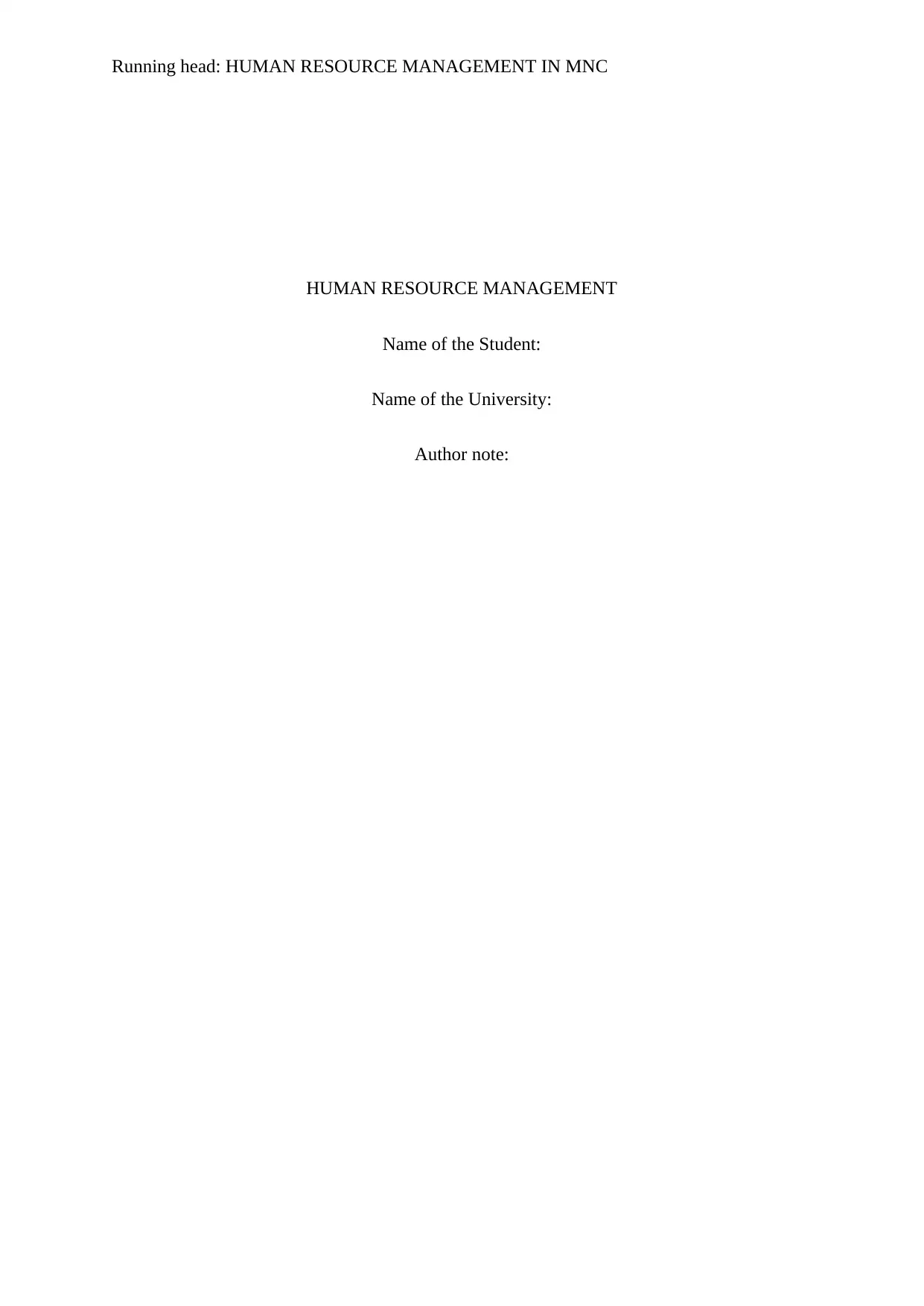
Running head: HUMAN RESOURCE MANAGEMENT IN MNC
HUMAN RESOURCE MANAGEMENT
Name of the Student:
Name of the University:
Author note:
HUMAN RESOURCE MANAGEMENT
Name of the Student:
Name of the University:
Author note:
Paraphrase This Document
Need a fresh take? Get an instant paraphrase of this document with our AI Paraphraser
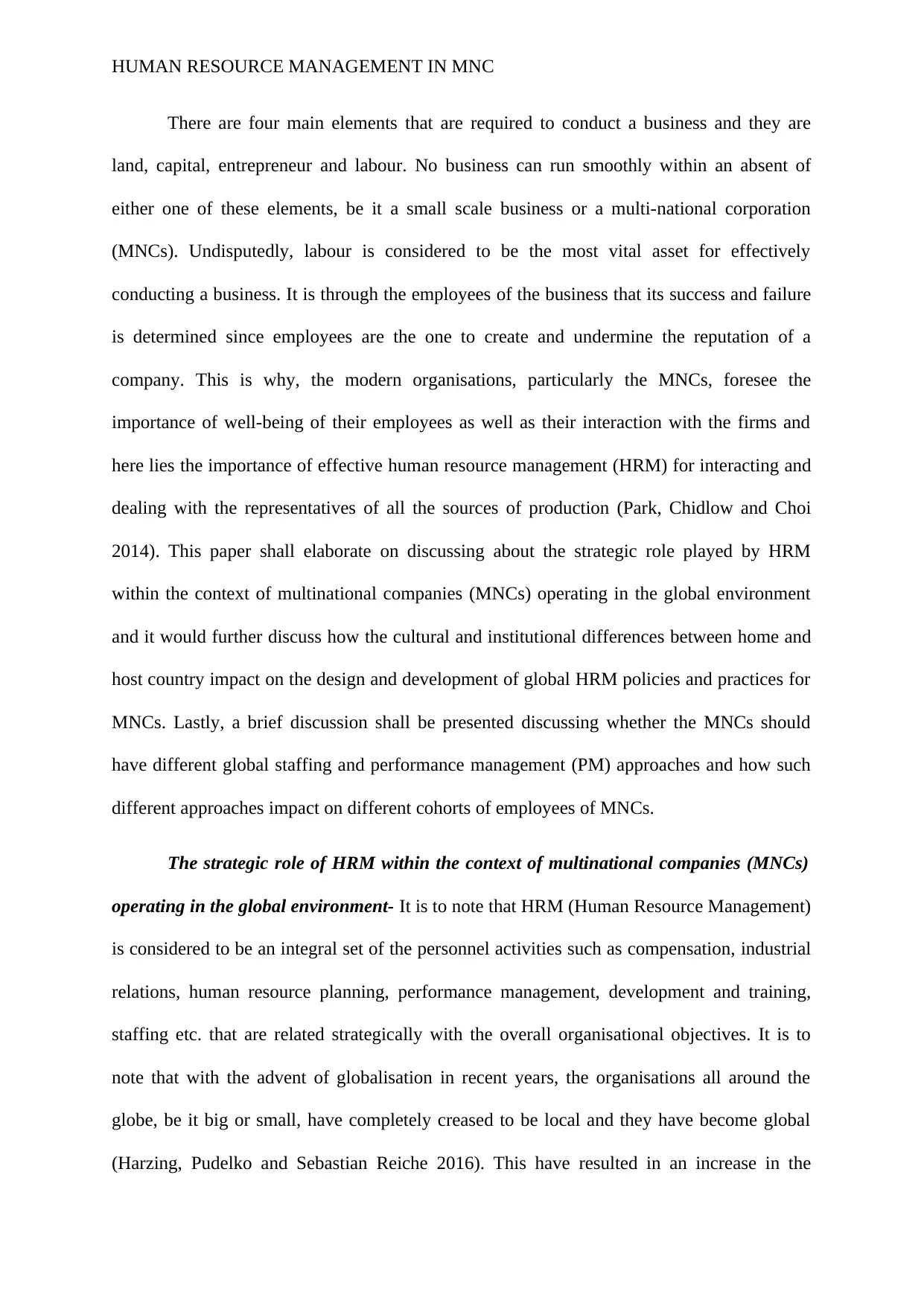
HUMAN RESOURCE MANAGEMENT IN MNC
There are four main elements that are required to conduct a business and they are
land, capital, entrepreneur and labour. No business can run smoothly within an absent of
either one of these elements, be it a small scale business or a multi-national corporation
(MNCs). Undisputedly, labour is considered to be the most vital asset for effectively
conducting a business. It is through the employees of the business that its success and failure
is determined since employees are the one to create and undermine the reputation of a
company. This is why, the modern organisations, particularly the MNCs, foresee the
importance of well-being of their employees as well as their interaction with the firms and
here lies the importance of effective human resource management (HRM) for interacting and
dealing with the representatives of all the sources of production (Park, Chidlow and Choi
2014). This paper shall elaborate on discussing about the strategic role played by HRM
within the context of multinational companies (MNCs) operating in the global environment
and it would further discuss how the cultural and institutional differences between home and
host country impact on the design and development of global HRM policies and practices for
MNCs. Lastly, a brief discussion shall be presented discussing whether the MNCs should
have different global staffing and performance management (PM) approaches and how such
different approaches impact on different cohorts of employees of MNCs.
The strategic role of HRM within the context of multinational companies (MNCs)
operating in the global environment- It is to note that HRM (Human Resource Management)
is considered to be an integral set of the personnel activities such as compensation, industrial
relations, human resource planning, performance management, development and training,
staffing etc. that are related strategically with the overall organisational objectives. It is to
note that with the advent of globalisation in recent years, the organisations all around the
globe, be it big or small, have completely creased to be local and they have become global
(Harzing, Pudelko and Sebastian Reiche 2016). This have resulted in an increase in the
There are four main elements that are required to conduct a business and they are
land, capital, entrepreneur and labour. No business can run smoothly within an absent of
either one of these elements, be it a small scale business or a multi-national corporation
(MNCs). Undisputedly, labour is considered to be the most vital asset for effectively
conducting a business. It is through the employees of the business that its success and failure
is determined since employees are the one to create and undermine the reputation of a
company. This is why, the modern organisations, particularly the MNCs, foresee the
importance of well-being of their employees as well as their interaction with the firms and
here lies the importance of effective human resource management (HRM) for interacting and
dealing with the representatives of all the sources of production (Park, Chidlow and Choi
2014). This paper shall elaborate on discussing about the strategic role played by HRM
within the context of multinational companies (MNCs) operating in the global environment
and it would further discuss how the cultural and institutional differences between home and
host country impact on the design and development of global HRM policies and practices for
MNCs. Lastly, a brief discussion shall be presented discussing whether the MNCs should
have different global staffing and performance management (PM) approaches and how such
different approaches impact on different cohorts of employees of MNCs.
The strategic role of HRM within the context of multinational companies (MNCs)
operating in the global environment- It is to note that HRM (Human Resource Management)
is considered to be an integral set of the personnel activities such as compensation, industrial
relations, human resource planning, performance management, development and training,
staffing etc. that are related strategically with the overall organisational objectives. It is to
note that with the advent of globalisation in recent years, the organisations all around the
globe, be it big or small, have completely creased to be local and they have become global
(Harzing, Pudelko and Sebastian Reiche 2016). This have resulted in an increase in the
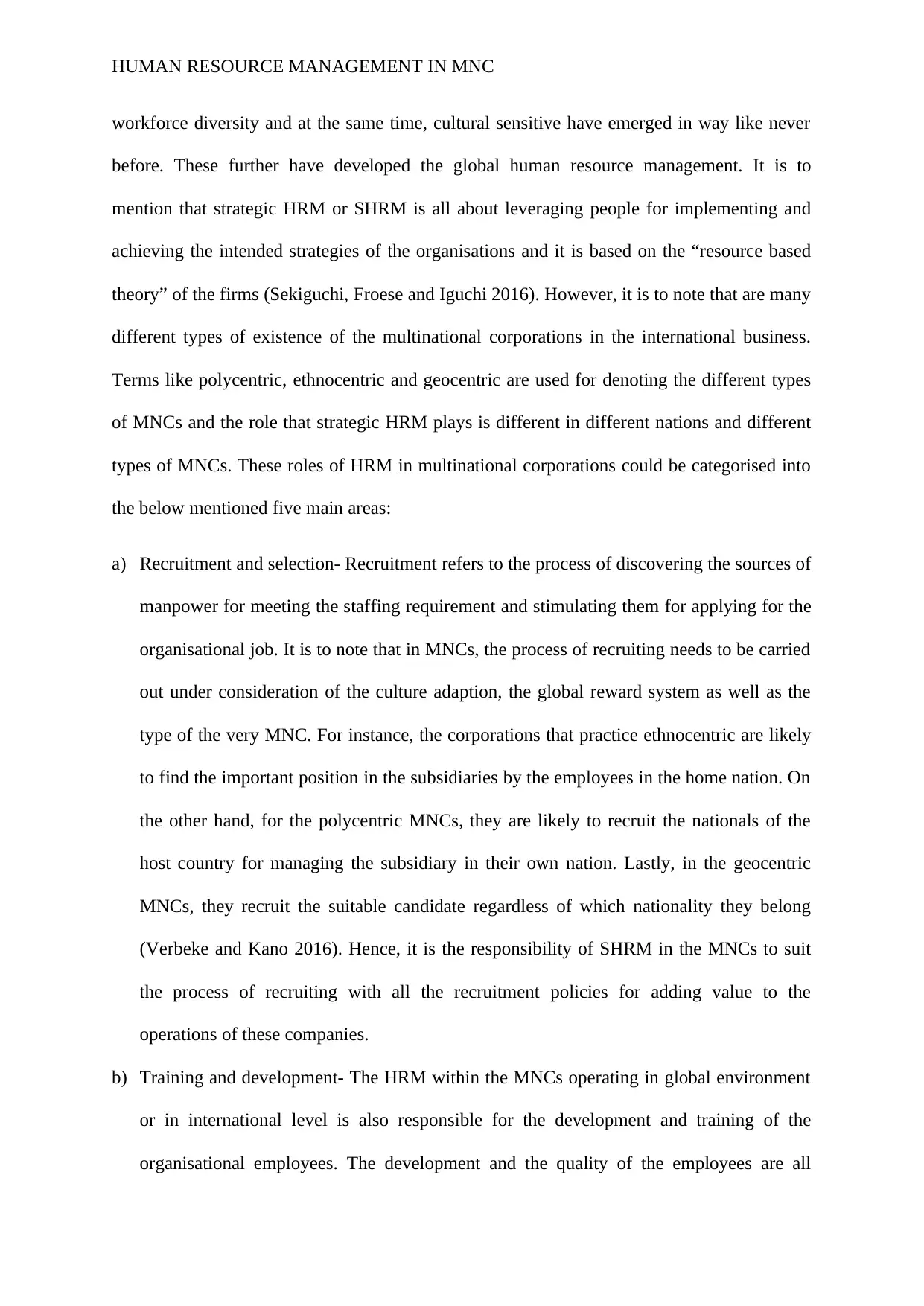
HUMAN RESOURCE MANAGEMENT IN MNC
workforce diversity and at the same time, cultural sensitive have emerged in way like never
before. These further have developed the global human resource management. It is to
mention that strategic HRM or SHRM is all about leveraging people for implementing and
achieving the intended strategies of the organisations and it is based on the “resource based
theory” of the firms (Sekiguchi, Froese and Iguchi 2016). However, it is to note that are many
different types of existence of the multinational corporations in the international business.
Terms like polycentric, ethnocentric and geocentric are used for denoting the different types
of MNCs and the role that strategic HRM plays is different in different nations and different
types of MNCs. These roles of HRM in multinational corporations could be categorised into
the below mentioned five main areas:
a) Recruitment and selection- Recruitment refers to the process of discovering the sources of
manpower for meeting the staffing requirement and stimulating them for applying for the
organisational job. It is to note that in MNCs, the process of recruiting needs to be carried
out under consideration of the culture adaption, the global reward system as well as the
type of the very MNC. For instance, the corporations that practice ethnocentric are likely
to find the important position in the subsidiaries by the employees in the home nation. On
the other hand, for the polycentric MNCs, they are likely to recruit the nationals of the
host country for managing the subsidiary in their own nation. Lastly, in the geocentric
MNCs, they recruit the suitable candidate regardless of which nationality they belong
(Verbeke and Kano 2016). Hence, it is the responsibility of SHRM in the MNCs to suit
the process of recruiting with all the recruitment policies for adding value to the
operations of these companies.
b) Training and development- The HRM within the MNCs operating in global environment
or in international level is also responsible for the development and training of the
organisational employees. The development and the quality of the employees are all
workforce diversity and at the same time, cultural sensitive have emerged in way like never
before. These further have developed the global human resource management. It is to
mention that strategic HRM or SHRM is all about leveraging people for implementing and
achieving the intended strategies of the organisations and it is based on the “resource based
theory” of the firms (Sekiguchi, Froese and Iguchi 2016). However, it is to note that are many
different types of existence of the multinational corporations in the international business.
Terms like polycentric, ethnocentric and geocentric are used for denoting the different types
of MNCs and the role that strategic HRM plays is different in different nations and different
types of MNCs. These roles of HRM in multinational corporations could be categorised into
the below mentioned five main areas:
a) Recruitment and selection- Recruitment refers to the process of discovering the sources of
manpower for meeting the staffing requirement and stimulating them for applying for the
organisational job. It is to note that in MNCs, the process of recruiting needs to be carried
out under consideration of the culture adaption, the global reward system as well as the
type of the very MNC. For instance, the corporations that practice ethnocentric are likely
to find the important position in the subsidiaries by the employees in the home nation. On
the other hand, for the polycentric MNCs, they are likely to recruit the nationals of the
host country for managing the subsidiary in their own nation. Lastly, in the geocentric
MNCs, they recruit the suitable candidate regardless of which nationality they belong
(Verbeke and Kano 2016). Hence, it is the responsibility of SHRM in the MNCs to suit
the process of recruiting with all the recruitment policies for adding value to the
operations of these companies.
b) Training and development- The HRM within the MNCs operating in global environment
or in international level is also responsible for the development and training of the
organisational employees. The development and the quality of the employees are all
⊘ This is a preview!⊘
Do you want full access?
Subscribe today to unlock all pages.

Trusted by 1+ million students worldwide
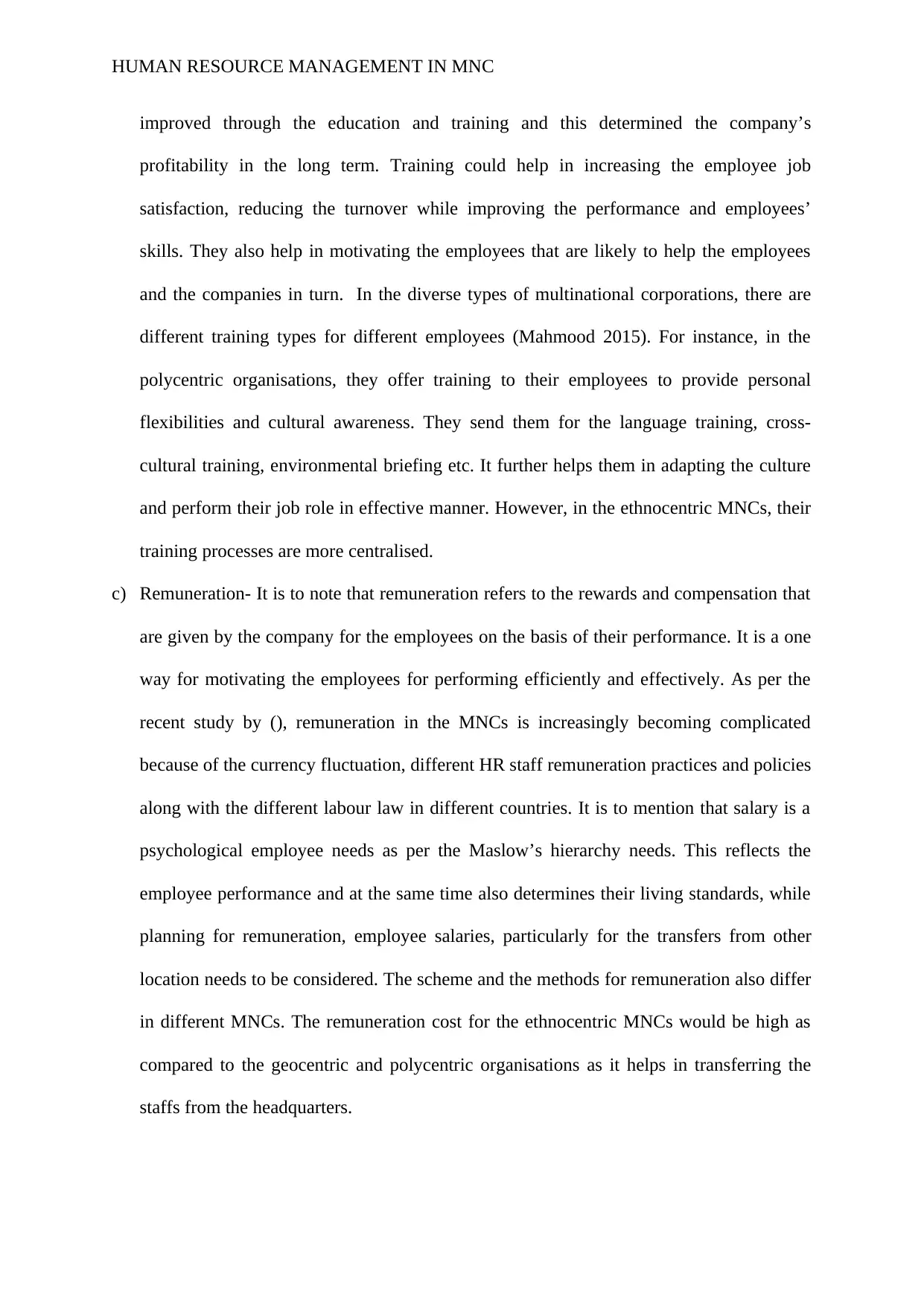
HUMAN RESOURCE MANAGEMENT IN MNC
improved through the education and training and this determined the company’s
profitability in the long term. Training could help in increasing the employee job
satisfaction, reducing the turnover while improving the performance and employees’
skills. They also help in motivating the employees that are likely to help the employees
and the companies in turn. In the diverse types of multinational corporations, there are
different training types for different employees (Mahmood 2015). For instance, in the
polycentric organisations, they offer training to their employees to provide personal
flexibilities and cultural awareness. They send them for the language training, cross-
cultural training, environmental briefing etc. It further helps them in adapting the culture
and perform their job role in effective manner. However, in the ethnocentric MNCs, their
training processes are more centralised.
c) Remuneration- It is to note that remuneration refers to the rewards and compensation that
are given by the company for the employees on the basis of their performance. It is a one
way for motivating the employees for performing efficiently and effectively. As per the
recent study by (), remuneration in the MNCs is increasingly becoming complicated
because of the currency fluctuation, different HR staff remuneration practices and policies
along with the different labour law in different countries. It is to mention that salary is a
psychological employee needs as per the Maslow’s hierarchy needs. This reflects the
employee performance and at the same time also determines their living standards, while
planning for remuneration, employee salaries, particularly for the transfers from other
location needs to be considered. The scheme and the methods for remuneration also differ
in different MNCs. The remuneration cost for the ethnocentric MNCs would be high as
compared to the geocentric and polycentric organisations as it helps in transferring the
staffs from the headquarters.
improved through the education and training and this determined the company’s
profitability in the long term. Training could help in increasing the employee job
satisfaction, reducing the turnover while improving the performance and employees’
skills. They also help in motivating the employees that are likely to help the employees
and the companies in turn. In the diverse types of multinational corporations, there are
different training types for different employees (Mahmood 2015). For instance, in the
polycentric organisations, they offer training to their employees to provide personal
flexibilities and cultural awareness. They send them for the language training, cross-
cultural training, environmental briefing etc. It further helps them in adapting the culture
and perform their job role in effective manner. However, in the ethnocentric MNCs, their
training processes are more centralised.
c) Remuneration- It is to note that remuneration refers to the rewards and compensation that
are given by the company for the employees on the basis of their performance. It is a one
way for motivating the employees for performing efficiently and effectively. As per the
recent study by (), remuneration in the MNCs is increasingly becoming complicated
because of the currency fluctuation, different HR staff remuneration practices and policies
along with the different labour law in different countries. It is to mention that salary is a
psychological employee needs as per the Maslow’s hierarchy needs. This reflects the
employee performance and at the same time also determines their living standards, while
planning for remuneration, employee salaries, particularly for the transfers from other
location needs to be considered. The scheme and the methods for remuneration also differ
in different MNCs. The remuneration cost for the ethnocentric MNCs would be high as
compared to the geocentric and polycentric organisations as it helps in transferring the
staffs from the headquarters.
Paraphrase This Document
Need a fresh take? Get an instant paraphrase of this document with our AI Paraphraser
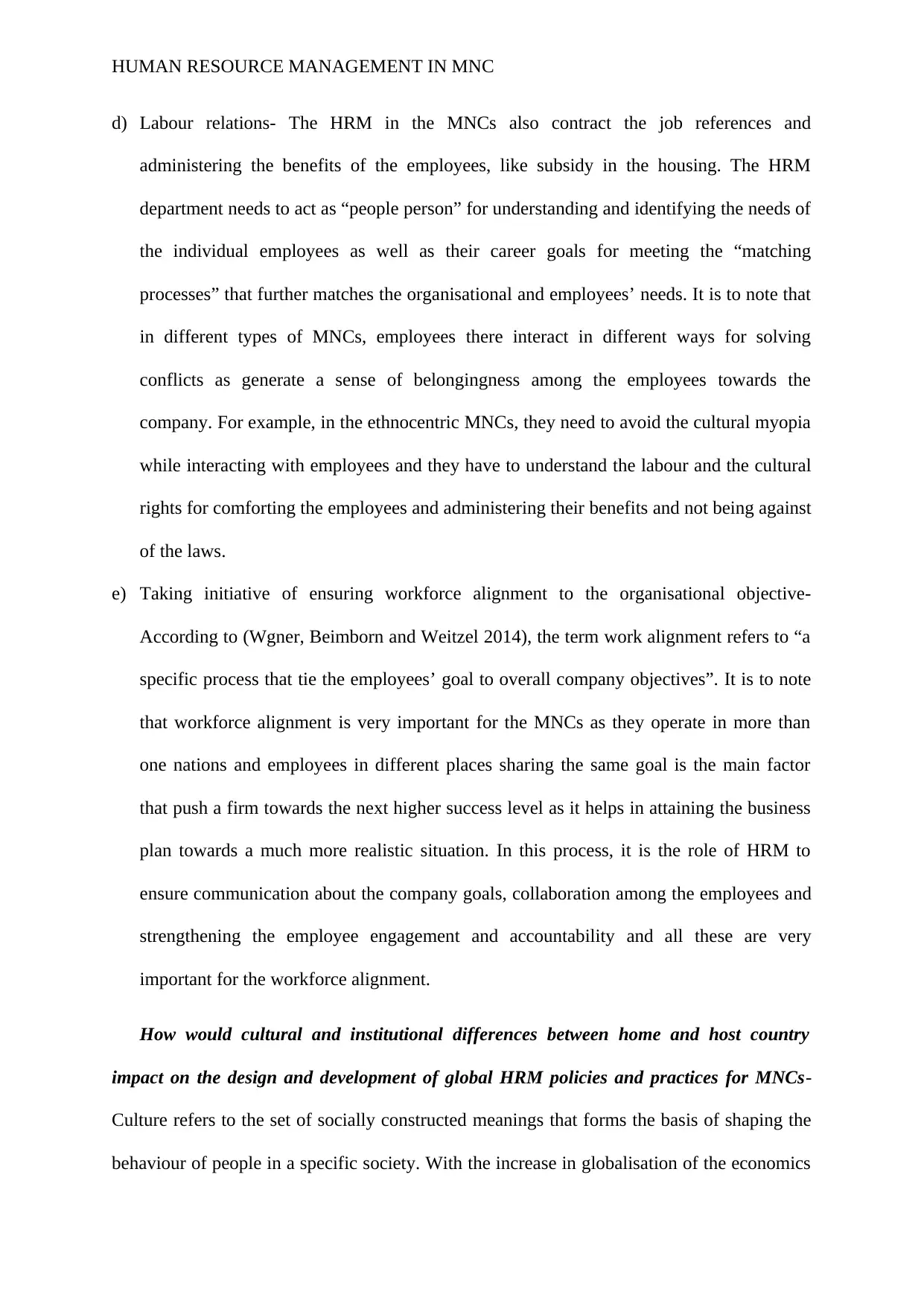
HUMAN RESOURCE MANAGEMENT IN MNC
d) Labour relations- The HRM in the MNCs also contract the job references and
administering the benefits of the employees, like subsidy in the housing. The HRM
department needs to act as “people person” for understanding and identifying the needs of
the individual employees as well as their career goals for meeting the “matching
processes” that further matches the organisational and employees’ needs. It is to note that
in different types of MNCs, employees there interact in different ways for solving
conflicts as generate a sense of belongingness among the employees towards the
company. For example, in the ethnocentric MNCs, they need to avoid the cultural myopia
while interacting with employees and they have to understand the labour and the cultural
rights for comforting the employees and administering their benefits and not being against
of the laws.
e) Taking initiative of ensuring workforce alignment to the organisational objective-
According to (Wgner, Beimborn and Weitzel 2014), the term work alignment refers to “a
specific process that tie the employees’ goal to overall company objectives”. It is to note
that workforce alignment is very important for the MNCs as they operate in more than
one nations and employees in different places sharing the same goal is the main factor
that push a firm towards the next higher success level as it helps in attaining the business
plan towards a much more realistic situation. In this process, it is the role of HRM to
ensure communication about the company goals, collaboration among the employees and
strengthening the employee engagement and accountability and all these are very
important for the workforce alignment.
How would cultural and institutional differences between home and host country
impact on the design and development of global HRM policies and practices for MNCs-
Culture refers to the set of socially constructed meanings that forms the basis of shaping the
behaviour of people in a specific society. With the increase in globalisation of the economics
d) Labour relations- The HRM in the MNCs also contract the job references and
administering the benefits of the employees, like subsidy in the housing. The HRM
department needs to act as “people person” for understanding and identifying the needs of
the individual employees as well as their career goals for meeting the “matching
processes” that further matches the organisational and employees’ needs. It is to note that
in different types of MNCs, employees there interact in different ways for solving
conflicts as generate a sense of belongingness among the employees towards the
company. For example, in the ethnocentric MNCs, they need to avoid the cultural myopia
while interacting with employees and they have to understand the labour and the cultural
rights for comforting the employees and administering their benefits and not being against
of the laws.
e) Taking initiative of ensuring workforce alignment to the organisational objective-
According to (Wgner, Beimborn and Weitzel 2014), the term work alignment refers to “a
specific process that tie the employees’ goal to overall company objectives”. It is to note
that workforce alignment is very important for the MNCs as they operate in more than
one nations and employees in different places sharing the same goal is the main factor
that push a firm towards the next higher success level as it helps in attaining the business
plan towards a much more realistic situation. In this process, it is the role of HRM to
ensure communication about the company goals, collaboration among the employees and
strengthening the employee engagement and accountability and all these are very
important for the workforce alignment.
How would cultural and institutional differences between home and host country
impact on the design and development of global HRM policies and practices for MNCs-
Culture refers to the set of socially constructed meanings that forms the basis of shaping the
behaviour of people in a specific society. With the increase in globalisation of the economics
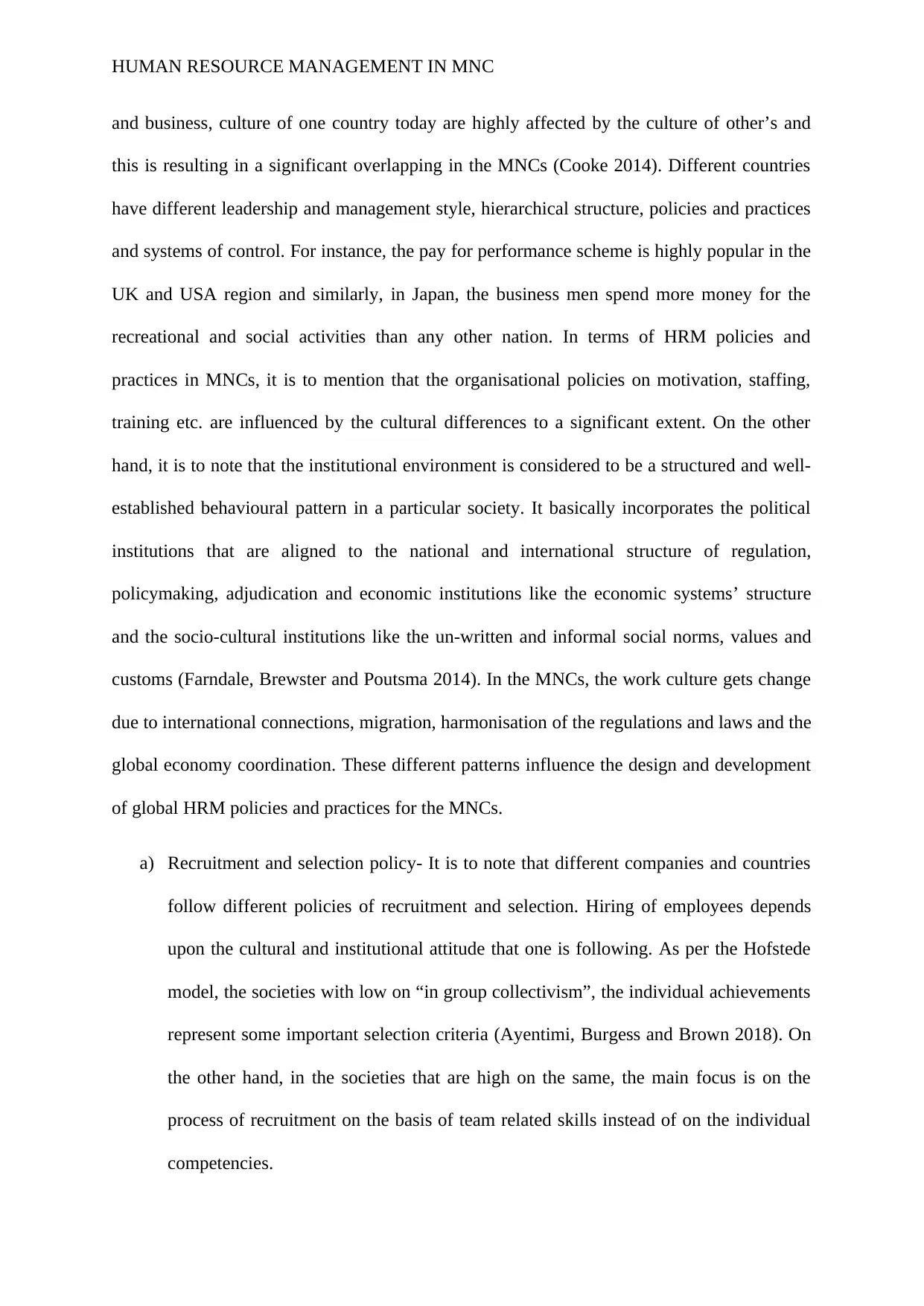
HUMAN RESOURCE MANAGEMENT IN MNC
and business, culture of one country today are highly affected by the culture of other’s and
this is resulting in a significant overlapping in the MNCs (Cooke 2014). Different countries
have different leadership and management style, hierarchical structure, policies and practices
and systems of control. For instance, the pay for performance scheme is highly popular in the
UK and USA region and similarly, in Japan, the business men spend more money for the
recreational and social activities than any other nation. In terms of HRM policies and
practices in MNCs, it is to mention that the organisational policies on motivation, staffing,
training etc. are influenced by the cultural differences to a significant extent. On the other
hand, it is to note that the institutional environment is considered to be a structured and well-
established behavioural pattern in a particular society. It basically incorporates the political
institutions that are aligned to the national and international structure of regulation,
policymaking, adjudication and economic institutions like the economic systems’ structure
and the socio-cultural institutions like the un-written and informal social norms, values and
customs (Farndale, Brewster and Poutsma 2014). In the MNCs, the work culture gets change
due to international connections, migration, harmonisation of the regulations and laws and the
global economy coordination. These different patterns influence the design and development
of global HRM policies and practices for the MNCs.
a) Recruitment and selection policy- It is to note that different companies and countries
follow different policies of recruitment and selection. Hiring of employees depends
upon the cultural and institutional attitude that one is following. As per the Hofstede
model, the societies with low on “in group collectivism”, the individual achievements
represent some important selection criteria (Ayentimi, Burgess and Brown 2018). On
the other hand, in the societies that are high on the same, the main focus is on the
process of recruitment on the basis of team related skills instead of on the individual
competencies.
and business, culture of one country today are highly affected by the culture of other’s and
this is resulting in a significant overlapping in the MNCs (Cooke 2014). Different countries
have different leadership and management style, hierarchical structure, policies and practices
and systems of control. For instance, the pay for performance scheme is highly popular in the
UK and USA region and similarly, in Japan, the business men spend more money for the
recreational and social activities than any other nation. In terms of HRM policies and
practices in MNCs, it is to mention that the organisational policies on motivation, staffing,
training etc. are influenced by the cultural differences to a significant extent. On the other
hand, it is to note that the institutional environment is considered to be a structured and well-
established behavioural pattern in a particular society. It basically incorporates the political
institutions that are aligned to the national and international structure of regulation,
policymaking, adjudication and economic institutions like the economic systems’ structure
and the socio-cultural institutions like the un-written and informal social norms, values and
customs (Farndale, Brewster and Poutsma 2014). In the MNCs, the work culture gets change
due to international connections, migration, harmonisation of the regulations and laws and the
global economy coordination. These different patterns influence the design and development
of global HRM policies and practices for the MNCs.
a) Recruitment and selection policy- It is to note that different companies and countries
follow different policies of recruitment and selection. Hiring of employees depends
upon the cultural and institutional attitude that one is following. As per the Hofstede
model, the societies with low on “in group collectivism”, the individual achievements
represent some important selection criteria (Ayentimi, Burgess and Brown 2018). On
the other hand, in the societies that are high on the same, the main focus is on the
process of recruitment on the basis of team related skills instead of on the individual
competencies.
⊘ This is a preview!⊘
Do you want full access?
Subscribe today to unlock all pages.

Trusted by 1+ million students worldwide
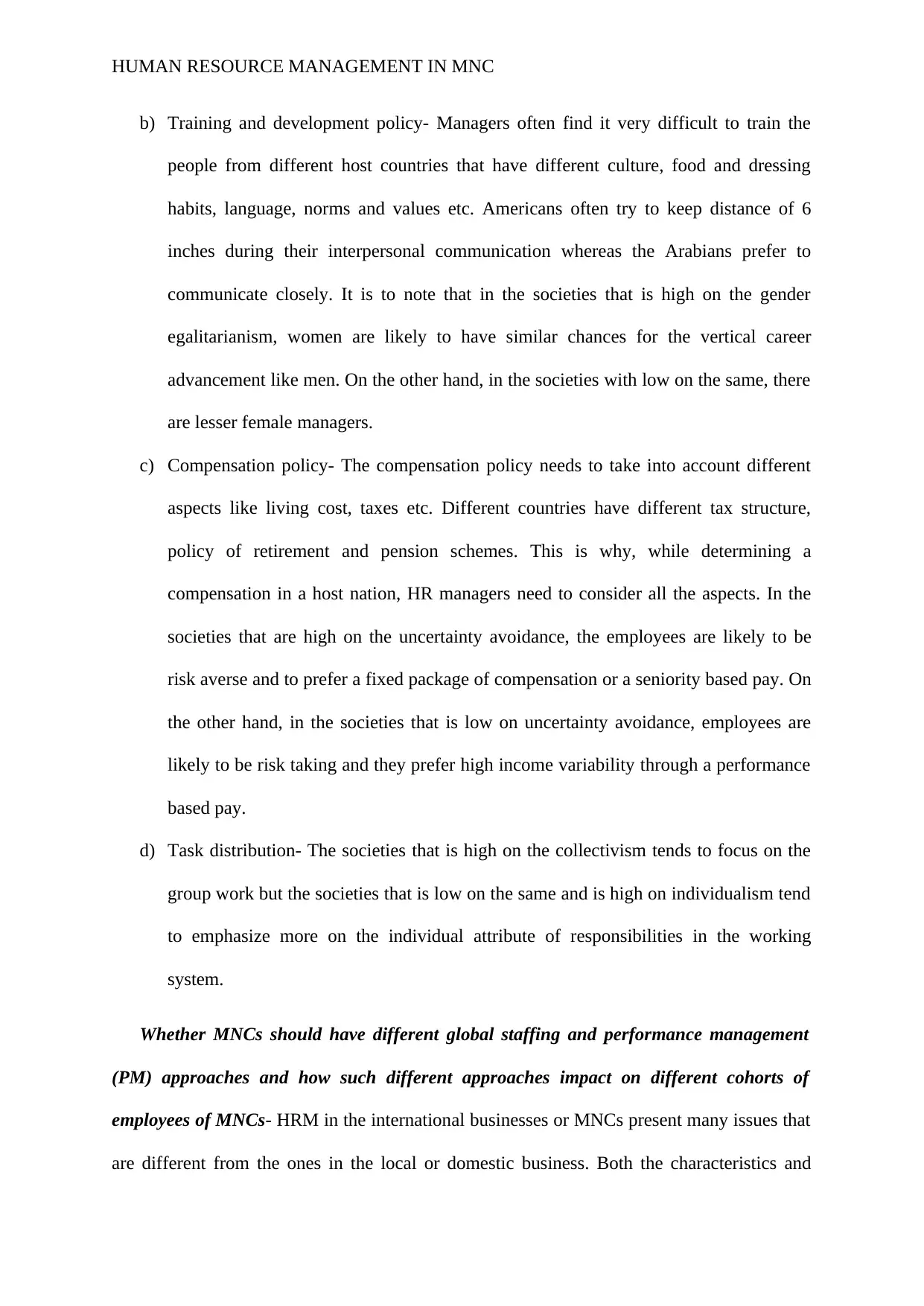
HUMAN RESOURCE MANAGEMENT IN MNC
b) Training and development policy- Managers often find it very difficult to train the
people from different host countries that have different culture, food and dressing
habits, language, norms and values etc. Americans often try to keep distance of 6
inches during their interpersonal communication whereas the Arabians prefer to
communicate closely. It is to note that in the societies that is high on the gender
egalitarianism, women are likely to have similar chances for the vertical career
advancement like men. On the other hand, in the societies with low on the same, there
are lesser female managers.
c) Compensation policy- The compensation policy needs to take into account different
aspects like living cost, taxes etc. Different countries have different tax structure,
policy of retirement and pension schemes. This is why, while determining a
compensation in a host nation, HR managers need to consider all the aspects. In the
societies that are high on the uncertainty avoidance, the employees are likely to be
risk averse and to prefer a fixed package of compensation or a seniority based pay. On
the other hand, in the societies that is low on uncertainty avoidance, employees are
likely to be risk taking and they prefer high income variability through a performance
based pay.
d) Task distribution- The societies that is high on the collectivism tends to focus on the
group work but the societies that is low on the same and is high on individualism tend
to emphasize more on the individual attribute of responsibilities in the working
system.
Whether MNCs should have different global staffing and performance management
(PM) approaches and how such different approaches impact on different cohorts of
employees of MNCs- HRM in the international businesses or MNCs present many issues that
are different from the ones in the local or domestic business. Both the characteristics and
b) Training and development policy- Managers often find it very difficult to train the
people from different host countries that have different culture, food and dressing
habits, language, norms and values etc. Americans often try to keep distance of 6
inches during their interpersonal communication whereas the Arabians prefer to
communicate closely. It is to note that in the societies that is high on the gender
egalitarianism, women are likely to have similar chances for the vertical career
advancement like men. On the other hand, in the societies with low on the same, there
are lesser female managers.
c) Compensation policy- The compensation policy needs to take into account different
aspects like living cost, taxes etc. Different countries have different tax structure,
policy of retirement and pension schemes. This is why, while determining a
compensation in a host nation, HR managers need to consider all the aspects. In the
societies that are high on the uncertainty avoidance, the employees are likely to be
risk averse and to prefer a fixed package of compensation or a seniority based pay. On
the other hand, in the societies that is low on uncertainty avoidance, employees are
likely to be risk taking and they prefer high income variability through a performance
based pay.
d) Task distribution- The societies that is high on the collectivism tends to focus on the
group work but the societies that is low on the same and is high on individualism tend
to emphasize more on the individual attribute of responsibilities in the working
system.
Whether MNCs should have different global staffing and performance management
(PM) approaches and how such different approaches impact on different cohorts of
employees of MNCs- HRM in the international businesses or MNCs present many issues that
are different from the ones in the local or domestic business. Both the characteristics and
Paraphrase This Document
Need a fresh take? Get an instant paraphrase of this document with our AI Paraphraser
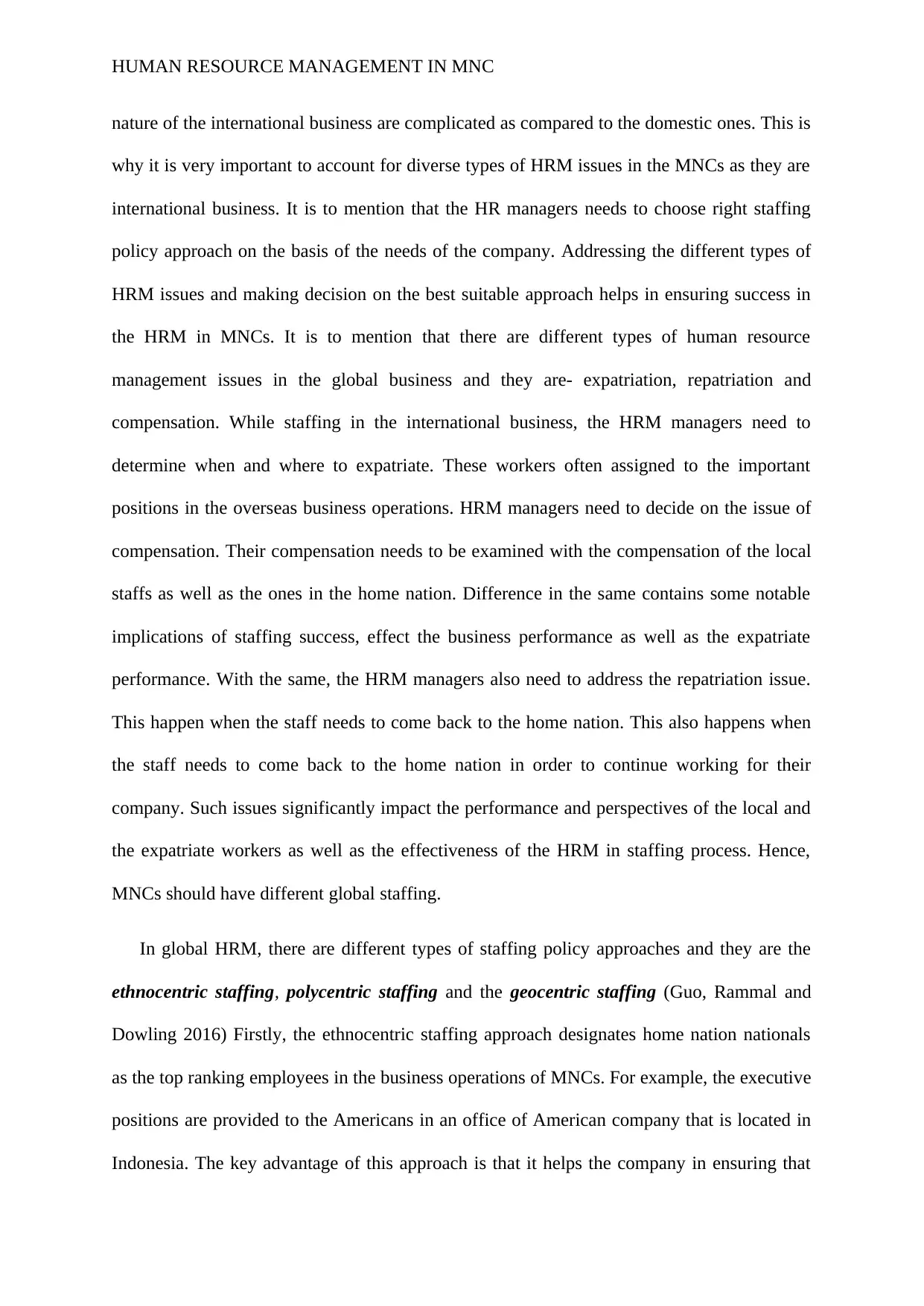
HUMAN RESOURCE MANAGEMENT IN MNC
nature of the international business are complicated as compared to the domestic ones. This is
why it is very important to account for diverse types of HRM issues in the MNCs as they are
international business. It is to mention that the HR managers needs to choose right staffing
policy approach on the basis of the needs of the company. Addressing the different types of
HRM issues and making decision on the best suitable approach helps in ensuring success in
the HRM in MNCs. It is to mention that there are different types of human resource
management issues in the global business and they are- expatriation, repatriation and
compensation. While staffing in the international business, the HRM managers need to
determine when and where to expatriate. These workers often assigned to the important
positions in the overseas business operations. HRM managers need to decide on the issue of
compensation. Their compensation needs to be examined with the compensation of the local
staffs as well as the ones in the home nation. Difference in the same contains some notable
implications of staffing success, effect the business performance as well as the expatriate
performance. With the same, the HRM managers also need to address the repatriation issue.
This happen when the staff needs to come back to the home nation. This also happens when
the staff needs to come back to the home nation in order to continue working for their
company. Such issues significantly impact the performance and perspectives of the local and
the expatriate workers as well as the effectiveness of the HRM in staffing process. Hence,
MNCs should have different global staffing.
In global HRM, there are different types of staffing policy approaches and they are the
ethnocentric staffing, polycentric staffing and the geocentric staffing (Guo, Rammal and
Dowling 2016) Firstly, the ethnocentric staffing approach designates home nation nationals
as the top ranking employees in the business operations of MNCs. For example, the executive
positions are provided to the Americans in an office of American company that is located in
Indonesia. The key advantage of this approach is that it helps the company in ensuring that
nature of the international business are complicated as compared to the domestic ones. This is
why it is very important to account for diverse types of HRM issues in the MNCs as they are
international business. It is to mention that the HR managers needs to choose right staffing
policy approach on the basis of the needs of the company. Addressing the different types of
HRM issues and making decision on the best suitable approach helps in ensuring success in
the HRM in MNCs. It is to mention that there are different types of human resource
management issues in the global business and they are- expatriation, repatriation and
compensation. While staffing in the international business, the HRM managers need to
determine when and where to expatriate. These workers often assigned to the important
positions in the overseas business operations. HRM managers need to decide on the issue of
compensation. Their compensation needs to be examined with the compensation of the local
staffs as well as the ones in the home nation. Difference in the same contains some notable
implications of staffing success, effect the business performance as well as the expatriate
performance. With the same, the HRM managers also need to address the repatriation issue.
This happen when the staff needs to come back to the home nation. This also happens when
the staff needs to come back to the home nation in order to continue working for their
company. Such issues significantly impact the performance and perspectives of the local and
the expatriate workers as well as the effectiveness of the HRM in staffing process. Hence,
MNCs should have different global staffing.
In global HRM, there are different types of staffing policy approaches and they are the
ethnocentric staffing, polycentric staffing and the geocentric staffing (Guo, Rammal and
Dowling 2016) Firstly, the ethnocentric staffing approach designates home nation nationals
as the top ranking employees in the business operations of MNCs. For example, the executive
positions are provided to the Americans in an office of American company that is located in
Indonesia. The key advantage of this approach is that it helps the company in ensuring that
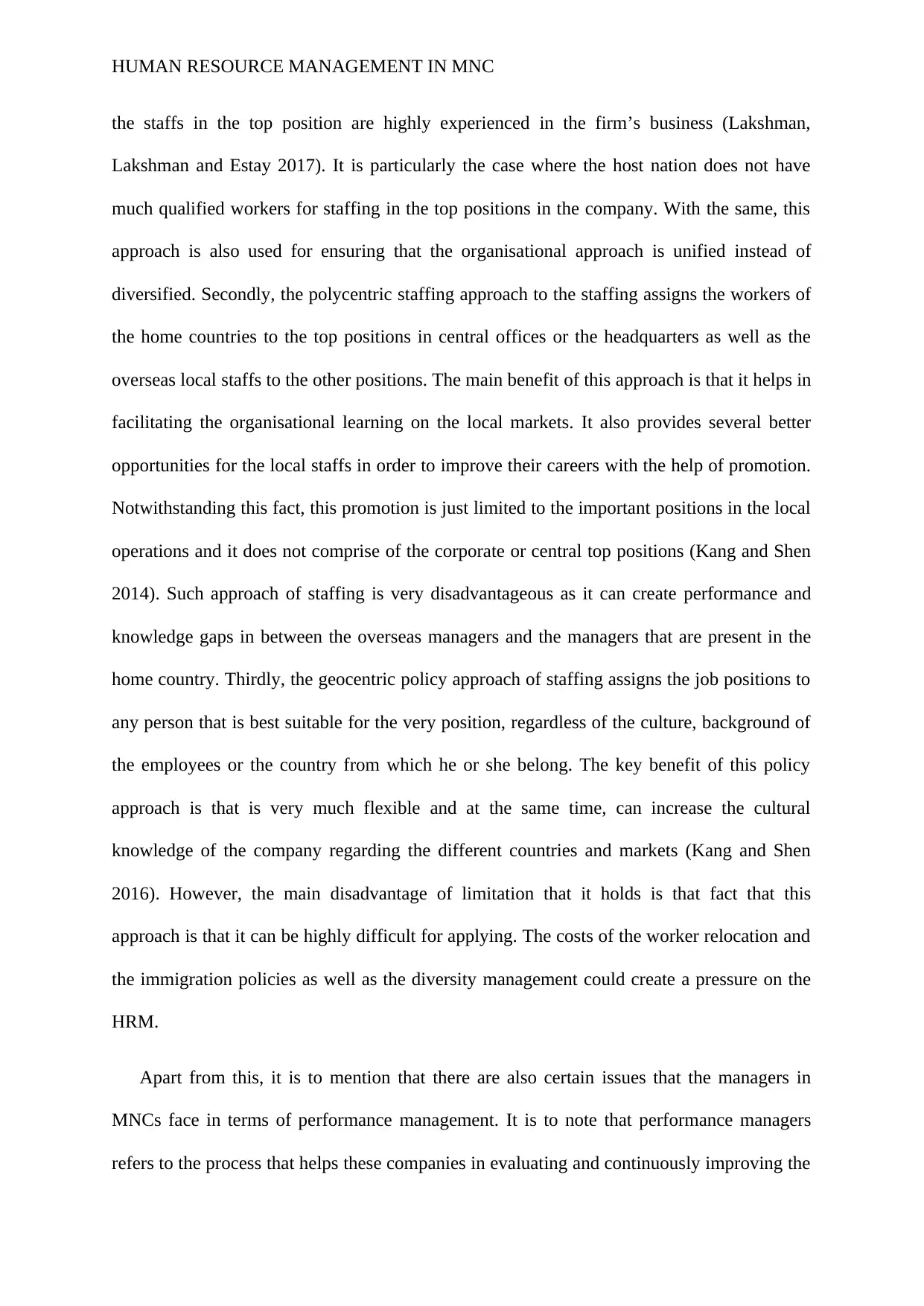
HUMAN RESOURCE MANAGEMENT IN MNC
the staffs in the top position are highly experienced in the firm’s business (Lakshman,
Lakshman and Estay 2017). It is particularly the case where the host nation does not have
much qualified workers for staffing in the top positions in the company. With the same, this
approach is also used for ensuring that the organisational approach is unified instead of
diversified. Secondly, the polycentric staffing approach to the staffing assigns the workers of
the home countries to the top positions in central offices or the headquarters as well as the
overseas local staffs to the other positions. The main benefit of this approach is that it helps in
facilitating the organisational learning on the local markets. It also provides several better
opportunities for the local staffs in order to improve their careers with the help of promotion.
Notwithstanding this fact, this promotion is just limited to the important positions in the local
operations and it does not comprise of the corporate or central top positions (Kang and Shen
2014). Such approach of staffing is very disadvantageous as it can create performance and
knowledge gaps in between the overseas managers and the managers that are present in the
home country. Thirdly, the geocentric policy approach of staffing assigns the job positions to
any person that is best suitable for the very position, regardless of the culture, background of
the employees or the country from which he or she belong. The key benefit of this policy
approach is that is very much flexible and at the same time, can increase the cultural
knowledge of the company regarding the different countries and markets (Kang and Shen
2016). However, the main disadvantage of limitation that it holds is that fact that this
approach is that it can be highly difficult for applying. The costs of the worker relocation and
the immigration policies as well as the diversity management could create a pressure on the
HRM.
Apart from this, it is to mention that there are also certain issues that the managers in
MNCs face in terms of performance management. It is to note that performance managers
refers to the process that helps these companies in evaluating and continuously improving the
the staffs in the top position are highly experienced in the firm’s business (Lakshman,
Lakshman and Estay 2017). It is particularly the case where the host nation does not have
much qualified workers for staffing in the top positions in the company. With the same, this
approach is also used for ensuring that the organisational approach is unified instead of
diversified. Secondly, the polycentric staffing approach to the staffing assigns the workers of
the home countries to the top positions in central offices or the headquarters as well as the
overseas local staffs to the other positions. The main benefit of this approach is that it helps in
facilitating the organisational learning on the local markets. It also provides several better
opportunities for the local staffs in order to improve their careers with the help of promotion.
Notwithstanding this fact, this promotion is just limited to the important positions in the local
operations and it does not comprise of the corporate or central top positions (Kang and Shen
2014). Such approach of staffing is very disadvantageous as it can create performance and
knowledge gaps in between the overseas managers and the managers that are present in the
home country. Thirdly, the geocentric policy approach of staffing assigns the job positions to
any person that is best suitable for the very position, regardless of the culture, background of
the employees or the country from which he or she belong. The key benefit of this policy
approach is that is very much flexible and at the same time, can increase the cultural
knowledge of the company regarding the different countries and markets (Kang and Shen
2016). However, the main disadvantage of limitation that it holds is that fact that this
approach is that it can be highly difficult for applying. The costs of the worker relocation and
the immigration policies as well as the diversity management could create a pressure on the
HRM.
Apart from this, it is to mention that there are also certain issues that the managers in
MNCs face in terms of performance management. It is to note that performance managers
refers to the process that helps these companies in evaluating and continuously improving the
⊘ This is a preview!⊘
Do you want full access?
Subscribe today to unlock all pages.

Trusted by 1+ million students worldwide
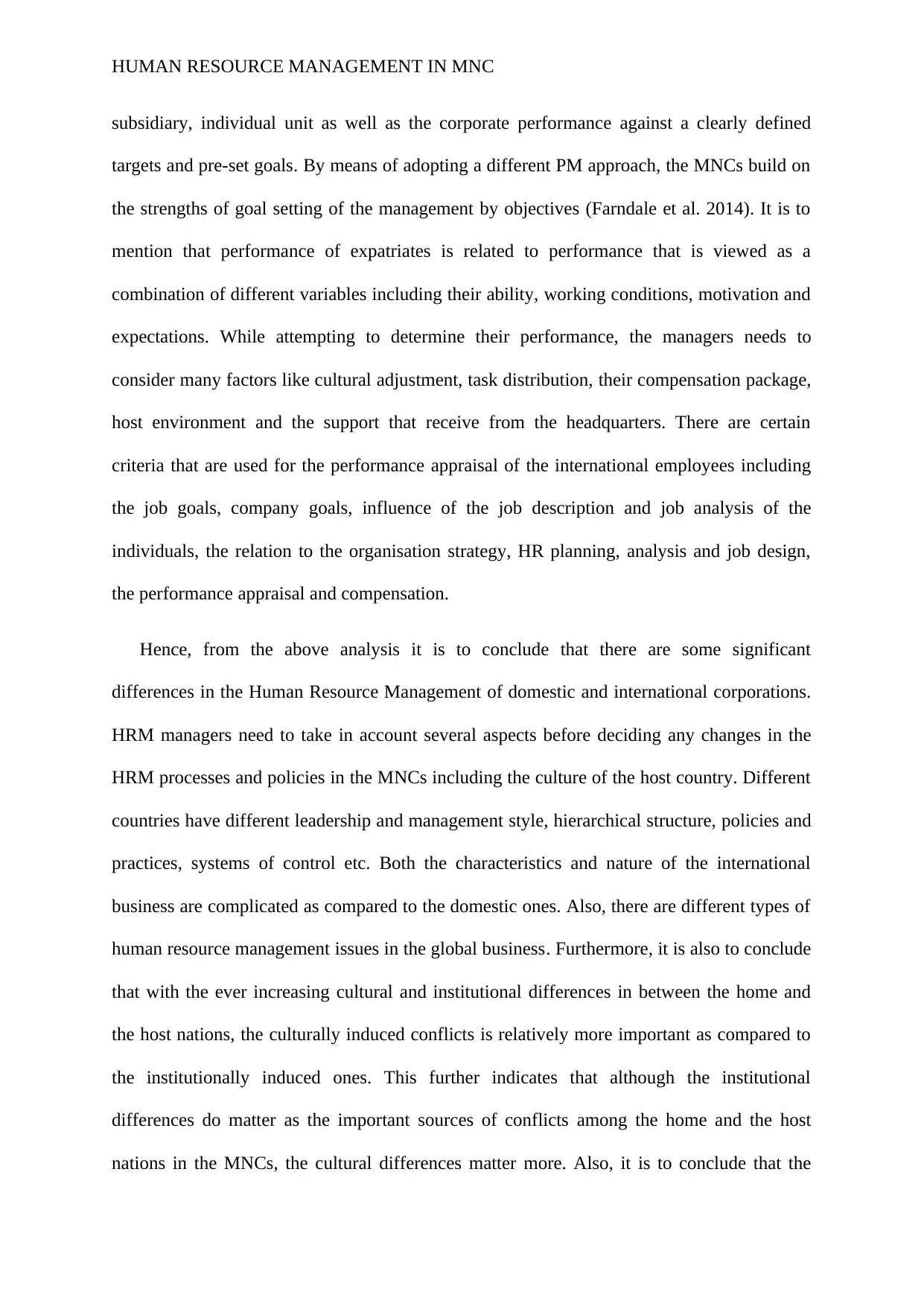
HUMAN RESOURCE MANAGEMENT IN MNC
subsidiary, individual unit as well as the corporate performance against a clearly defined
targets and pre-set goals. By means of adopting a different PM approach, the MNCs build on
the strengths of goal setting of the management by objectives (Farndale et al. 2014). It is to
mention that performance of expatriates is related to performance that is viewed as a
combination of different variables including their ability, working conditions, motivation and
expectations. While attempting to determine their performance, the managers needs to
consider many factors like cultural adjustment, task distribution, their compensation package,
host environment and the support that receive from the headquarters. There are certain
criteria that are used for the performance appraisal of the international employees including
the job goals, company goals, influence of the job description and job analysis of the
individuals, the relation to the organisation strategy, HR planning, analysis and job design,
the performance appraisal and compensation.
Hence, from the above analysis it is to conclude that there are some significant
differences in the Human Resource Management of domestic and international corporations.
HRM managers need to take in account several aspects before deciding any changes in the
HRM processes and policies in the MNCs including the culture of the host country. Different
countries have different leadership and management style, hierarchical structure, policies and
practices, systems of control etc. Both the characteristics and nature of the international
business are complicated as compared to the domestic ones. Also, there are different types of
human resource management issues in the global business. Furthermore, it is also to conclude
that with the ever increasing cultural and institutional differences in between the home and
the host nations, the culturally induced conflicts is relatively more important as compared to
the institutionally induced ones. This further indicates that although the institutional
differences do matter as the important sources of conflicts among the home and the host
nations in the MNCs, the cultural differences matter more. Also, it is to conclude that the
subsidiary, individual unit as well as the corporate performance against a clearly defined
targets and pre-set goals. By means of adopting a different PM approach, the MNCs build on
the strengths of goal setting of the management by objectives (Farndale et al. 2014). It is to
mention that performance of expatriates is related to performance that is viewed as a
combination of different variables including their ability, working conditions, motivation and
expectations. While attempting to determine their performance, the managers needs to
consider many factors like cultural adjustment, task distribution, their compensation package,
host environment and the support that receive from the headquarters. There are certain
criteria that are used for the performance appraisal of the international employees including
the job goals, company goals, influence of the job description and job analysis of the
individuals, the relation to the organisation strategy, HR planning, analysis and job design,
the performance appraisal and compensation.
Hence, from the above analysis it is to conclude that there are some significant
differences in the Human Resource Management of domestic and international corporations.
HRM managers need to take in account several aspects before deciding any changes in the
HRM processes and policies in the MNCs including the culture of the host country. Different
countries have different leadership and management style, hierarchical structure, policies and
practices, systems of control etc. Both the characteristics and nature of the international
business are complicated as compared to the domestic ones. Also, there are different types of
human resource management issues in the global business. Furthermore, it is also to conclude
that with the ever increasing cultural and institutional differences in between the home and
the host nations, the culturally induced conflicts is relatively more important as compared to
the institutionally induced ones. This further indicates that although the institutional
differences do matter as the important sources of conflicts among the home and the host
nations in the MNCs, the cultural differences matter more. Also, it is to conclude that the
Paraphrase This Document
Need a fresh take? Get an instant paraphrase of this document with our AI Paraphraser
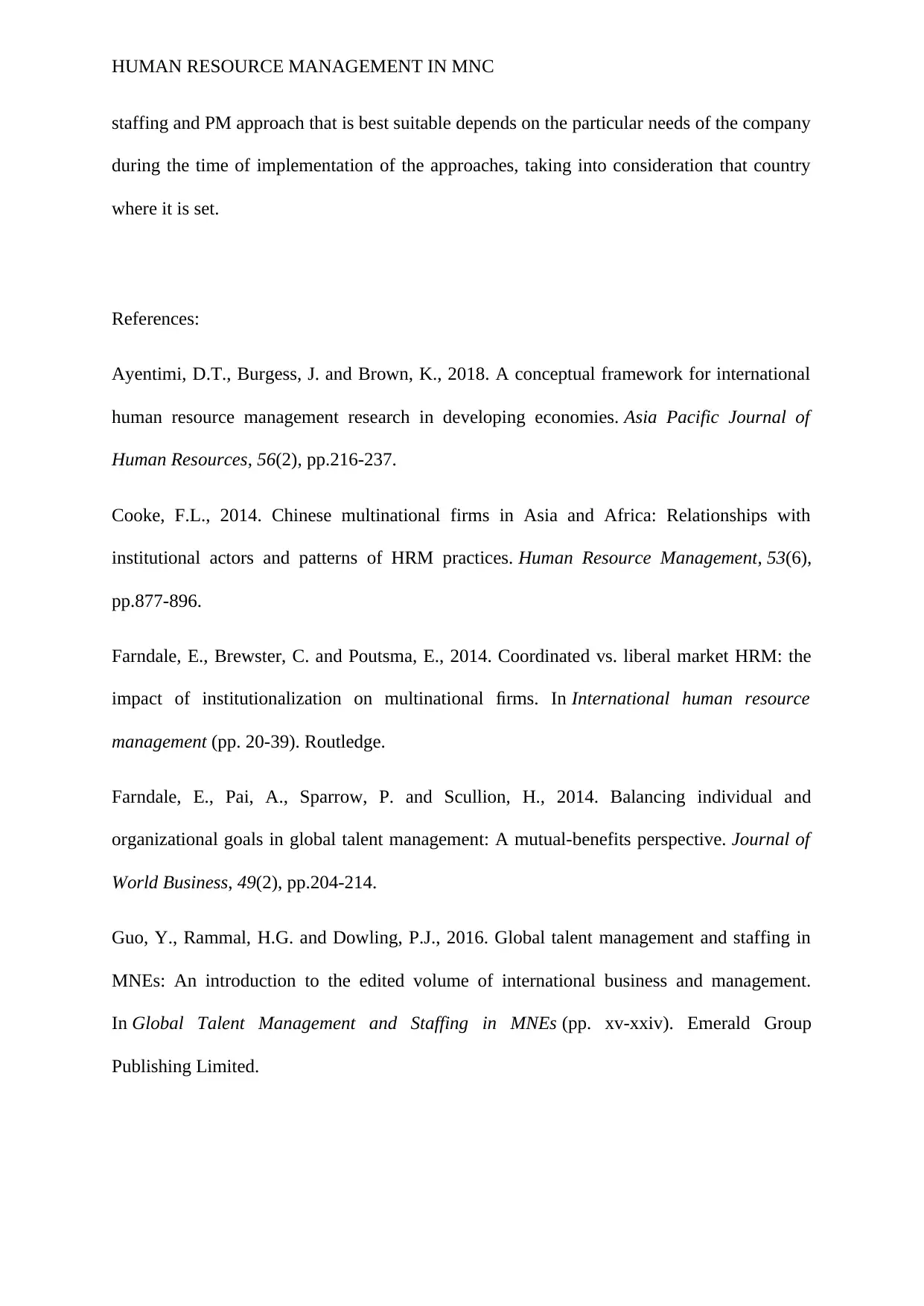
HUMAN RESOURCE MANAGEMENT IN MNC
staffing and PM approach that is best suitable depends on the particular needs of the company
during the time of implementation of the approaches, taking into consideration that country
where it is set.
References:
Ayentimi, D.T., Burgess, J. and Brown, K., 2018. A conceptual framework for international
human resource management research in developing economies. Asia Pacific Journal of
Human Resources, 56(2), pp.216-237.
Cooke, F.L., 2014. Chinese multinational firms in Asia and Africa: Relationships with
institutional actors and patterns of HRM practices. Human Resource Management, 53(6),
pp.877-896.
Farndale, E., Brewster, C. and Poutsma, E., 2014. Coordinated vs. liberal market HRM: the
impact of institutionalization on multinational firms. In International human resource
management (pp. 20-39). Routledge.
Farndale, E., Pai, A., Sparrow, P. and Scullion, H., 2014. Balancing individual and
organizational goals in global talent management: A mutual-benefits perspective. Journal of
World Business, 49(2), pp.204-214.
Guo, Y., Rammal, H.G. and Dowling, P.J., 2016. Global talent management and staffing in
MNEs: An introduction to the edited volume of international business and management.
In Global Talent Management and Staffing in MNEs (pp. xv-xxiv). Emerald Group
Publishing Limited.
staffing and PM approach that is best suitable depends on the particular needs of the company
during the time of implementation of the approaches, taking into consideration that country
where it is set.
References:
Ayentimi, D.T., Burgess, J. and Brown, K., 2018. A conceptual framework for international
human resource management research in developing economies. Asia Pacific Journal of
Human Resources, 56(2), pp.216-237.
Cooke, F.L., 2014. Chinese multinational firms in Asia and Africa: Relationships with
institutional actors and patterns of HRM practices. Human Resource Management, 53(6),
pp.877-896.
Farndale, E., Brewster, C. and Poutsma, E., 2014. Coordinated vs. liberal market HRM: the
impact of institutionalization on multinational firms. In International human resource
management (pp. 20-39). Routledge.
Farndale, E., Pai, A., Sparrow, P. and Scullion, H., 2014. Balancing individual and
organizational goals in global talent management: A mutual-benefits perspective. Journal of
World Business, 49(2), pp.204-214.
Guo, Y., Rammal, H.G. and Dowling, P.J., 2016. Global talent management and staffing in
MNEs: An introduction to the edited volume of international business and management.
In Global Talent Management and Staffing in MNEs (pp. xv-xxiv). Emerald Group
Publishing Limited.
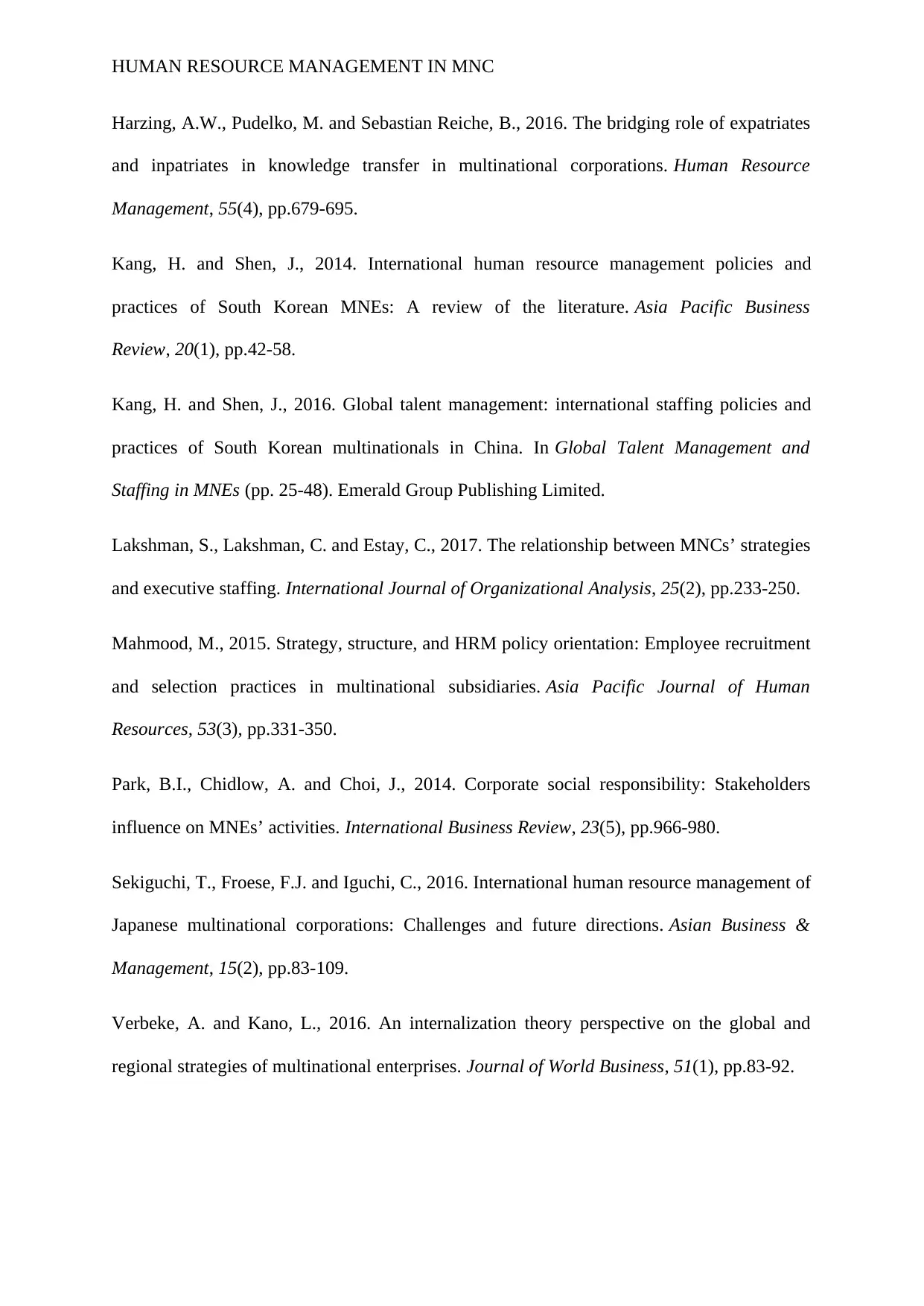
HUMAN RESOURCE MANAGEMENT IN MNC
Harzing, A.W., Pudelko, M. and Sebastian Reiche, B., 2016. The bridging role of expatriates
and inpatriates in knowledge transfer in multinational corporations. Human Resource
Management, 55(4), pp.679-695.
Kang, H. and Shen, J., 2014. International human resource management policies and
practices of South Korean MNEs: A review of the literature. Asia Pacific Business
Review, 20(1), pp.42-58.
Kang, H. and Shen, J., 2016. Global talent management: international staffing policies and
practices of South Korean multinationals in China. In Global Talent Management and
Staffing in MNEs (pp. 25-48). Emerald Group Publishing Limited.
Lakshman, S., Lakshman, C. and Estay, C., 2017. The relationship between MNCs’ strategies
and executive staffing. International Journal of Organizational Analysis, 25(2), pp.233-250.
Mahmood, M., 2015. Strategy, structure, and HRM policy orientation: Employee recruitment
and selection practices in multinational subsidiaries. Asia Pacific Journal of Human
Resources, 53(3), pp.331-350.
Park, B.I., Chidlow, A. and Choi, J., 2014. Corporate social responsibility: Stakeholders
influence on MNEs’ activities. International Business Review, 23(5), pp.966-980.
Sekiguchi, T., Froese, F.J. and Iguchi, C., 2016. International human resource management of
Japanese multinational corporations: Challenges and future directions. Asian Business &
Management, 15(2), pp.83-109.
Verbeke, A. and Kano, L., 2016. An internalization theory perspective on the global and
regional strategies of multinational enterprises. Journal of World Business, 51(1), pp.83-92.
Harzing, A.W., Pudelko, M. and Sebastian Reiche, B., 2016. The bridging role of expatriates
and inpatriates in knowledge transfer in multinational corporations. Human Resource
Management, 55(4), pp.679-695.
Kang, H. and Shen, J., 2014. International human resource management policies and
practices of South Korean MNEs: A review of the literature. Asia Pacific Business
Review, 20(1), pp.42-58.
Kang, H. and Shen, J., 2016. Global talent management: international staffing policies and
practices of South Korean multinationals in China. In Global Talent Management and
Staffing in MNEs (pp. 25-48). Emerald Group Publishing Limited.
Lakshman, S., Lakshman, C. and Estay, C., 2017. The relationship between MNCs’ strategies
and executive staffing. International Journal of Organizational Analysis, 25(2), pp.233-250.
Mahmood, M., 2015. Strategy, structure, and HRM policy orientation: Employee recruitment
and selection practices in multinational subsidiaries. Asia Pacific Journal of Human
Resources, 53(3), pp.331-350.
Park, B.I., Chidlow, A. and Choi, J., 2014. Corporate social responsibility: Stakeholders
influence on MNEs’ activities. International Business Review, 23(5), pp.966-980.
Sekiguchi, T., Froese, F.J. and Iguchi, C., 2016. International human resource management of
Japanese multinational corporations: Challenges and future directions. Asian Business &
Management, 15(2), pp.83-109.
Verbeke, A. and Kano, L., 2016. An internalization theory perspective on the global and
regional strategies of multinational enterprises. Journal of World Business, 51(1), pp.83-92.
⊘ This is a preview!⊘
Do you want full access?
Subscribe today to unlock all pages.

Trusted by 1+ million students worldwide
1 out of 13
Related Documents
Your All-in-One AI-Powered Toolkit for Academic Success.
+13062052269
info@desklib.com
Available 24*7 on WhatsApp / Email
![[object Object]](/_next/static/media/star-bottom.7253800d.svg)
Unlock your academic potential
Copyright © 2020–2026 A2Z Services. All Rights Reserved. Developed and managed by ZUCOL.


